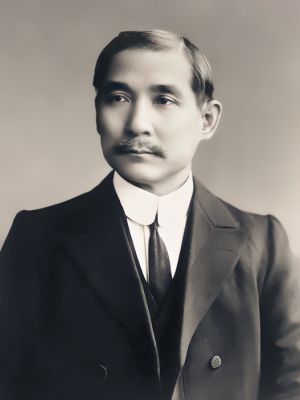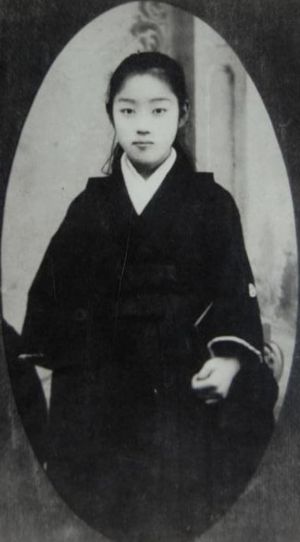One of our staff members is contributing considerably to a News Archiving service at Mu. Any well educated (Masters, PhD or above) users who wish to make comments on news sites, please contact Jim Burton directly rather than using this list, and we can work on maximising view count.
Sun Yat-sen: Difference between revisions
fix inconsistency copied from English Wikipedia, minor grammar fixes |
No edit summary |
||
| (2 intermediate revisions by one other user not shown) | |||
| Line 1: | Line 1: | ||
[[File:Sun Yat Sen.jpg|thumb|Sun Yat-sen]] | [[File:Sun Yat Sen.jpg|thumb|Sun Yat-sen]] | ||
'''[[Wikipedia:Sun Yat-sen|Sun Yat-sen]]''' (12 November 1866 – 12 March 1925) was a Chinese stateman, first provisional president of the [[Wikipedia:Republic_of_China_(1912–1949)|Republic of China]] proclaimed in 1912 after the overthrow of the Qing Dynasty, and the first leader of Kuomintang (Nationalist Party of China). He is considered the founder of modern China, and uniquely revered both by the Communist Party in mainland China and the Nationalist Party in Taiwan (de jure Republic of China). He is called "Father of the Nation" in Republic of China, and "Forerunner of the Revolution" in People's Republic of China. | '''[[Wikipedia:Sun Yat-sen|Sun Yat-sen]]''' (12 November 1866 – 12 March 1925) was a Chinese stateman, first provisional president of the [[Wikipedia:Republic_of_China_(1912–1949)|Republic of China]] proclaimed in 1912 after the overthrow of the Qing Dynasty, and the first leader of Kuomintang (Nationalist Party of China). He is considered the founder of modern China, and uniquely revered both by the [[Communism|Communist]] Party in mainland China and the Nationalist Party in Taiwan (de jure Republic of China). He is called "Father of the Nation" in Republic of China, and "Forerunner of the Revolution" in People's Republic of China. | ||
During his exile in Japan, he married Ōtsuki Kaoru, who is sometimes spoken of as Sun's teenage wife, first meeting her when she was 11. | |||
The later part of the 19th Century was marked by significant turbulence in the [[Wikipedia:Qing_dynasty|Qing Empire]], exacerbated by China's inability to keep up with more technologically advanced Western nations and those that underwent significant reforms (like Japan). In the late 1880s and 1890s, Sun Yat-sen, increasingly frustrated by the Qing government's inability and refusal to implement needed reforms, was establishing connections with other revolutionary thinkers and quit his medical practice to devote his time to political philosophy and efforts to transform China. | The later part of the 19th Century was marked by significant turbulence in the [[Wikipedia:Qing_dynasty|Qing Empire]], exacerbated by China's inability to keep up with more technologically advanced Western nations and those that underwent significant reforms (like Japan). In the late 1880s and 1890s, Sun Yat-sen, increasingly frustrated by the Qing government's inability and refusal to implement needed reforms, was establishing connections with other revolutionary thinkers and quit his medical practice to devote his time to political philosophy and efforts to transform China. | ||
| Line 10: | Line 12: | ||
==Relationship with Otsuki Kaoru== | ==Relationship with Otsuki Kaoru== | ||
[[File:KaoruOtsuki大月薰.jpg|thumb|Kaoru Otsuki]] | [[File:KaoruOtsuki大月薰.jpg|thumb|Kaoru Otsuki]] | ||
[[Wikipedia:Kaoru Otsuki|Kaoru Otsuki]] (大月 薰, Ōtsuki Kaoru) was born on August 6th, 1888 in Yokohama, Kanagawa Prefecture in Japan, daughter of Ōtsuki Kinji, a silk merchant. The family house burned down in 1898 as a result of fire in Yokohama, temporarily living on the second floor of an acquaintance in Yokohama's Chinatown, a trader from the same town as Sun Yat-sen, who also supported him. There in 1898, Kaoru first met Sun Yat-sen, when she knocked over a vase and apologized to Sun. | [[Wikipedia:Kaoru Otsuki|Kaoru Otsuki]] (大月 薰, Ōtsuki Kaoru) was born on August 6th, 1888 in Yokohama, Kanagawa Prefecture in Japan, daughter of Ōtsuki Kinji, a silk merchant. The family house burned down in 1898 as a result of fire in Yokohama, the family temporarily living on the second floor of an acquaintance in Yokohama's Chinatown, Wen Bingshin, a trader from the same town as Sun Yat-sen, who also supported him. There in 1898, Kaoru first met Sun Yat-sen, when she knocked over a vase and apologized to Sun. | ||
In 1901, when Kaoru was 13, Sun asked Kaoru's father for permission to marry her, but | In 1901, when Kaoru was 13, Sun asked Kaoru's father for permission to marry her, but the father refused (Sun was 35 at the time). A year later, Sun asked Kaoru directly and this time, Kaoru's father relented. They were engaged in 1902, but in 1903, Sun Yat-sen went abroad but kept in touch with Kaoru. Kaoru and Sun's wedding ceremony was held in Yokohama in 1905 after his return to Japan. At the time, Sun was still married to his first wife, [[Wikipedia:Lu_Muzhen|Lu Muzhen]]. | ||
However, Sun left Japan for China before Kaoru gave birth to their daughter, Fumiko, on May 12th 1906. Remittances from Sun Yat-sen stopped and Kinji's business was in a recession. Fumiko was adopted by the Miyagawa family in 1911. | However, Sun left Japan for China before Kaoru gave birth to their daughter, Fumiko, on May 12th 1906. Remittances from Sun Yat-sen stopped and Kinji's business was in a recession. Due to the financial issues, Fumiko was adopted by the Miyagawa family in 1911. | ||
Kaoru later remarried twice, first to Shūji Miwa (三輪 秀司), | Kaoru later remarried twice, first to Shūji Miwa (三輪 秀司), younger brother of Shizuoka Bank president Shingorō Miwa (三輪 新五郎), and later to Motomune Sanekata (實方 元心), Buddhist abbot of the Tokoji Temple in Ashikaga, with whom she had two children. Kaoru was reunited with her daughter Fumiko in 1955, after the latter learned that she was Sun Yat-sen's child and visited the Tokoji Temple with her eldest son. | ||
Kaoru died on 21 December 1970 at the age of 82. The governments of the People's Republic of China (mainland China) and the Republic of China (Taiwan) have both acknowledged Kaoru's marriage to Sun Yat-sen, and their grandson by Fumiko was invited to the centennial celebrations of the Xinhai Revolution in Wuhan, China, in 2011. | Kaoru died on 21 December 1970 at the age of 82. The governments of the People's Republic of China (mainland China) and the Republic of China (Taiwan) have both acknowledged Kaoru's marriage to Sun Yat-sen, and their grandson by Fumiko was invited to the centennial celebrations of the Xinhai Revolution in Wuhan, China, in 2011. | ||
[[Category:Official Encyclopedia]][[Category:People]][[Category:People: Chinese]][[Category:People: Deceased]][[Category:People: Adult or Minor sexually attracted to or involved with the other]][[Category: People: Historical minor-attracted figures]][[Category:History & Events: Chinese]][[Category:History & Events: 1900s]][[Category:History & Events: 19th C]] | [[Category:Official Encyclopedia]][[Category:People]][[Category:People: Chinese]][[Category:People: Deceased]][[Category:People: Adult or Minor sexually attracted to or involved with the other]][[Category: People: Historical minor-attracted figures]][[Category:History & Events: Chinese]][[Category:History & Events: 1900s]][[Category:History & Events: 19th C]] | ||
Latest revision as of 04:51, 8 December 2023

Sun Yat-sen (12 November 1866 – 12 March 1925) was a Chinese stateman, first provisional president of the Republic of China proclaimed in 1912 after the overthrow of the Qing Dynasty, and the first leader of Kuomintang (Nationalist Party of China). He is considered the founder of modern China, and uniquely revered both by the Communist Party in mainland China and the Nationalist Party in Taiwan (de jure Republic of China). He is called "Father of the Nation" in Republic of China, and "Forerunner of the Revolution" in People's Republic of China.
During his exile in Japan, he married Ōtsuki Kaoru, who is sometimes spoken of as Sun's teenage wife, first meeting her when she was 11.
The later part of the 19th Century was marked by significant turbulence in the Qing Empire, exacerbated by China's inability to keep up with more technologically advanced Western nations and those that underwent significant reforms (like Japan). In the late 1880s and 1890s, Sun Yat-sen, increasingly frustrated by the Qing government's inability and refusal to implement needed reforms, was establishing connections with other revolutionary thinkers and quit his medical practice to devote his time to political philosophy and efforts to transform China.
His political life was marked by frequent exile. In 1896, he was in London, raising money for the revolutionary party and to support uprisings in China. He eventually found himself detained at the Chinese Embassy in London, where the Chinese Imperial Secret Service planned to smuggle him back to China and execute him for his revolutionary activity.
He was released after 12 days due to the efforts of James Cantlie, the Foreign Office and several British newspapers. He traveled by way of Canada to Japan to begin his exile there, arriving in Yokohama on August 16th, 1897, meeting Miyazaki Tōten. The Japanese who worked with Sun were motivated by a pan-Asian opposition to Western imperialism.
Relationship with Otsuki Kaoru

Kaoru Otsuki (大月 薰, Ōtsuki Kaoru) was born on August 6th, 1888 in Yokohama, Kanagawa Prefecture in Japan, daughter of Ōtsuki Kinji, a silk merchant. The family house burned down in 1898 as a result of fire in Yokohama, the family temporarily living on the second floor of an acquaintance in Yokohama's Chinatown, Wen Bingshin, a trader from the same town as Sun Yat-sen, who also supported him. There in 1898, Kaoru first met Sun Yat-sen, when she knocked over a vase and apologized to Sun.
In 1901, when Kaoru was 13, Sun asked Kaoru's father for permission to marry her, but the father refused (Sun was 35 at the time). A year later, Sun asked Kaoru directly and this time, Kaoru's father relented. They were engaged in 1902, but in 1903, Sun Yat-sen went abroad but kept in touch with Kaoru. Kaoru and Sun's wedding ceremony was held in Yokohama in 1905 after his return to Japan. At the time, Sun was still married to his first wife, Lu Muzhen.
However, Sun left Japan for China before Kaoru gave birth to their daughter, Fumiko, on May 12th 1906. Remittances from Sun Yat-sen stopped and Kinji's business was in a recession. Due to the financial issues, Fumiko was adopted by the Miyagawa family in 1911.
Kaoru later remarried twice, first to Shūji Miwa (三輪 秀司), younger brother of Shizuoka Bank president Shingorō Miwa (三輪 新五郎), and later to Motomune Sanekata (實方 元心), Buddhist abbot of the Tokoji Temple in Ashikaga, with whom she had two children. Kaoru was reunited with her daughter Fumiko in 1955, after the latter learned that she was Sun Yat-sen's child and visited the Tokoji Temple with her eldest son.
Kaoru died on 21 December 1970 at the age of 82. The governments of the People's Republic of China (mainland China) and the Republic of China (Taiwan) have both acknowledged Kaoru's marriage to Sun Yat-sen, and their grandson by Fumiko was invited to the centennial celebrations of the Xinhai Revolution in Wuhan, China, in 2011.